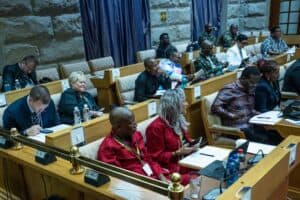To lessen the financial burden on hard-hit consumers, there has been no increase on bulk water charges imposed on all water boards for the 2020-21 financial year.

Cash-strapped waterboards have been thrown a R600 million lifeline to stay afloat amid cash shortages compounded by the Covid-19 pandemic.
In order to lessen the financial burden on hard-hit consumers, there has been no increase on bulk water charges imposed on all water boards for the 2020-21 financial year.
This emerged in Human Settlements, Water and Sanitation Minister Lindiwe Sisulu’s reply to a written parliamentary question from EFF MP Mathibe Rebecca Mohlala.
Mohlala wanted details on measures the Department of Water and Sanitation (DWS) had taken to assist water boards and municipalities to continue to supply clean and reliable drinking water to the residents with the tariff increase of 11.5% by her department.
Sisulu replied: “The DWS has also committed R600m in relief funds that will be distributed to cash-strapped water boards. These funds will also go some way in helping the water boards to absorb the increase in raw water charges.”
Sisulu said significant concessions had been made with regards to raw water use charges.
“In terms of water resource management charges (WRMC), if the charges had been approved in line with the policy (raw water pricing strategy), the charges would have been increased by a maximum of 56%. In terms of water resource infrastructure charges (WRIC), a maximum increase of 16.5% would also have been approved. The capital unit charge (CUC) which is the charge levied on users that take water from schemes that are funded off-budget has not been increased for the 2020-21 financial year. The zero percent increase has been imposed on those schemes that supply water to domestic users,” she said.
During a 10 November meeting of the Portfolio Committee on Human Settlements, Water and Sanitation, it was revealed that despite the zero tariff increase for water boards, some municipalities had approved tariffs at rates higher than what water boards originally proposed for 2020-21.
Municipalities such as the City of uMhlathuze increased their tariffs by 21.5%, Ekurhuleni Metropolitan Municipality by 13%, Tshwane Metro by 9% and Bela-Bela Local Municipality by 12%.
Trevor Balzer, DWS acting director-general, highlighted funding constraints that had led to delayed implementation of measures to secure water resource availability.
He told the committee an estimated R126 billion was required to finance key water resource development projects in the next 10 years.
“The R12 billion debt owed to water boards was a key challenge to the sustainability of water boards,” he said.
Sisulu said all the concessions have had a negative impact on the performance of the DWS in relation “to water resource management functions, water resource infrastructure development and maintenance”.
“The DWS provides assistance to the municipalities through the regional bulk infrastructure grant (RBIG) and the municipal water infrastructure grant (MWIG) for the development of new infrastructure and refurbishment thereof to ensure provision of clean water,” she said.
For more news your way, download The Citizen’s app for iOS and Android.






